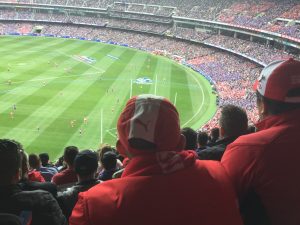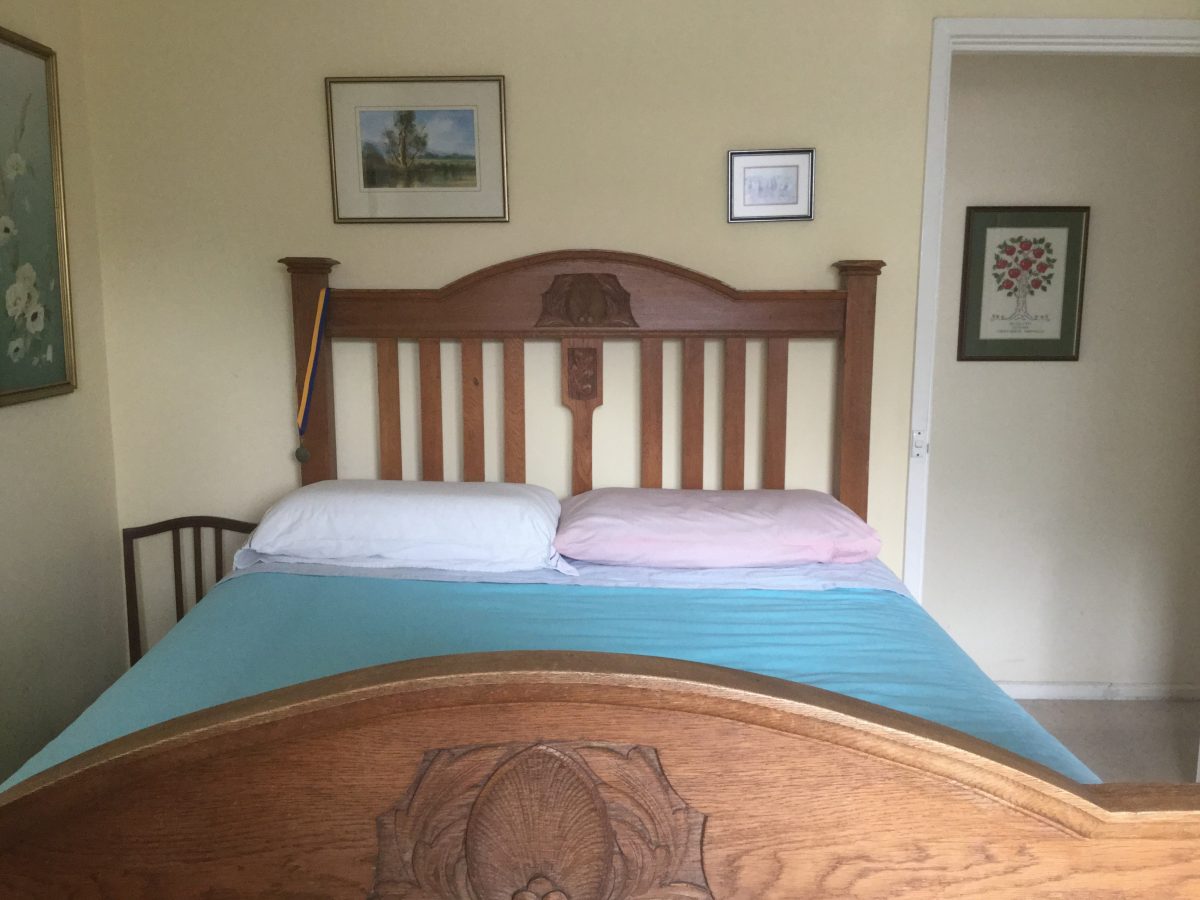Thinks: I’ve been on my right side for quite a while now; it may be time to roll over?
Push knees and feet down to move from foetal to straight position. Hope for no resultant cramp in calf or foot. Begin turning left knee towards the ceiling, followed by right knee. Slowly twist hips and backside. Position right elbow and forearm to take the weight of the trunk, push down hard, using the weight of the head to assist in reaching position in which one is lying on one’s back. Pause for breath. Re-position left knee and leg so that they may fold underneath during the next stage of the turn. Position right forearm and palm of right hand in such a way as to exert maximum force, readying right hand to reach out and pull on edge of mattress mid-way through the turn. Ready; steady: heave. Use weight of head to assist the manoeuvre. Pause for breath. Use right hand to check distance of trunk and legs from the side of the bed. If necessary, push back towards middle of bed to ensure there is little risk of falling put. Push down on the left forearm and hand and on right-hand to adopt semi-sitting position. Force backside a few inches towards the foot of the bed so that, when lying, one’s left shoulder is in the best position vis-a-vis the pillow. At the same time, adjust night shirt so that, when lying down again, it is not crinkled underneath the left side of one’s waist. Using right hand and forearm, allow the trunk to descend slowly from semi-sitting to lying position; test relationship of shoulder and pillow. If further adjustment is needed, repeat three previous manoeuvres. If satisfactory, pull or move left knee towards head, followed by right knee, to adopt foetal position. Adjust and re-adjust relative stance of left and right knees and feet to maximise immediate comfort. Sense precise angle of head and neck and adjust in order to minimise stiffness.
Close eyes. Smile inwardly. Hope for sleep.
Month: October 2016
Fields of Gold: the 2016 AFL Grand Final
 Result: The Western Bulldogs beat the Sydney Swans by 89 points (13-11) to 67 (10-7).
Result: The Western Bulldogs beat the Sydney Swans by 89 points (13-11) to 67 (10-7).
Fact: Sting provided the pre-game entertainment – but did not sing Fields of Gold.
History: On 15 May 2013 the Melbourne Age newspaper published an article by Bob Murphy, Western Bulldogs AFL player, entitled The dream that never dies. It began:
The Boston Red Sox baseball franchise in the Major League of America is a famous source of both fascination and inspiration for sport lovers all over the world.
Thrust into prominence in the early 20th century through the heroics of a champion team and Babe Ruth’s charismatic talent, the Red Sox were the hottest ticket around. Inexplicably, they then traded ‘the Babe’ to the New York Yankees, where he won even more championships and established the Yankees as the powerhouse franchise in the world. They remain so to this day and the ‘curse of the great Bambino’ was born.
Between 1918 and 2004 the Red Sox didn’t win a single pennant, despite coming painfully close a few times. That all changed when, 0-3 down in the best-of-seven American League Championships Series (against the Yankees, of course), the Red Sox fought their way back to claim the title, rid themselves of the curse and etch their names into sporting folklore for ever.
ESPN made a documentary on this incredible story simply titled Four Days In October. About four weeks ago I sat down to watch it, and it nearly ripped me in half.
In the final stages of the game, with victory a mere formality, the documentary-makers were able to capture the emotions of the Red Sox players and fans. Generation upon generation of broken hearts came together to cry, to cheer, to hold one another close and live in the world of their dreams.
As I sat watching I couldn’t help but draw the obvious comparisons to me and my Bulldogs.
Fact: On Sunday 2 October 2016, ABC television’s Offsiders began with Gerard Whateley declaring: “It’s a concept so big, in circumstances so far-fetched, as to feel like the stuff of make-believe.”
He referred to a stanza of Bob Murphy’s article: “Generation upon generation of broken hearts came together to cry, to cheer, to hold one another close, and live in the world of their dreams.” The discussion on Offsiders was joined by Caroline Wilson, Roy Masters and Waleed Aly.
Judgement: Gerard said it was “a quest that will be recounted from here until football eternity” – – “just about the best thing you’ve ever seen at the footy”. Caroline agreed: “We’ve seen a woman ride the Melbourne Cup winner, we saw Cathy Freeman at the Sydney Olympics. It was one of those days – one of the greatest afternoons, certainly in Australian football history, and one of the biggest days in Australian sport. It has allowed everyone now to think that they can do something like this.”
Things had conspired against the Western Bulldogs Football Club. The administration of the AFL had tried to merge them, relocate them, and at one stage cut off the club’s funds.
According to Waleed Aly the Bulldogs had had to trade success for survival for so long – selling great players in order to stay afloat financially. Roy Masters – vastly experienced in Australia’s sports sector and a delightful wordsmith – said he had been fascinated by the physical difference between the two teams in the final. Whereas so much of the preparation of football teams these days is based on science, metrics and method, this had been “just a desperate physical struggle – humans v computers. – – You could see the enterprise, enthusiasm and fitness of the Bulldogs and you could see the physical degeneration of the Swans.”
Folklore: The signature moment of the day happened on the podium when Bulldogs coach Luke Beveridge called for his injured captain, Bob Murphy, sometime Age correspondent, and put the medal around his neck – – a moment that “instantly became part of Australian sporting folklore”.
Caroline Wilson noted that most of the 99,981 people present had stayed for the presentations. “The Swans and their fans had been reduced to a bit player by the last 5-10 minutes, and yet everybody stayed – even those who were mourning needed to see this.”
Achievement awards:
Tom Boyd for provig his critics wrong.
Liam Picken, whose father Billy played in four losing grand finals for Collingwood.
Jason Johannisen won the Norm Smith Medal for ‘Best on Ground’.
Josh Kennedy, in a losing side, played (in the second) “one of the great Grand Final quarters”.
Dale Morris, including for a tackle on Buddy Franklin that led to a Bulldogs goal, and who was under an injury cloud during the finals series.
Club Chairman Peter Gordon, Luke Beveridge and Bob Murphy for building and operating a winning human culture.
Gerard Whateley, for consistently providing terrific sports journalism.Villain: the goal that was overturned unilaterally by someone upstairs using “the appalling intervention of flawed technology” (Gerard). However, as Roy pointed out, the conceit of technology was trumped “when humanity came back – with the Bulldogs kicking the next goal straight afterwards”.
The Swans: Must be more shattered than two years ago (when they were trounced by Hawthorn). “It will be a long way to come back; it’s a game they thought they should have won.”
Wrapping up: “This year, every final was won by the less experienced team – we may never see this again.”
In anticipation of the ARL Grand Final in Sydney, Gerard said: “If you believe in symmetry, if you believe in omens, then the fates have tipped the way of the Sharks.”
So the porch light can now be turned off. Harold isn’t coming home – but the Sharks are.

